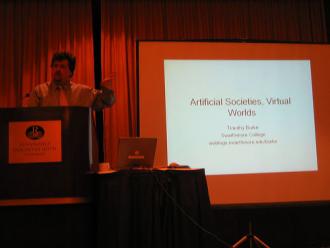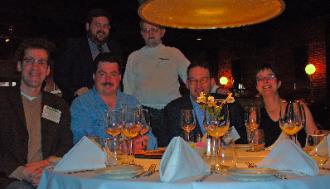Serendip is an independent site partnering with faculty at multiple colleges and universities around the world. Happy exploring!
Notes Towards Day 10: A Conversation with "Easily Distracted"

 |
 |
 |
|
Summary of our conversation by teal and mkarol
Anne's afterthoughts
Talking with Tim Burke, Citizen Intellectual
I. coursekeeping
we have 1-too many notetakers for today:
aseidman, teal, mkarol (?)
your first set of webpapers should all, by now, be up
(talk for a moment about this experience...?)
on Thursday, we're hosting two BMC English majors:
Nicole Gervasio and Jen Rajchel, who will talk w/ us about
'what the internet is doing to their [=our] intellectual lives':
Jen is constructing a digital archive for her senior thesis;
Nicole went w/ me to the English Institute on Genre in September, where she was particularly interested in Joe Slaughter's talk on "New Word Orders": the role of plagiarism/ other piratical practices in the long history of literary and economic globalization
please look @ the program for The English Institute
@ The Digital Humanities Manifesto 2.0
@ Beyond the Dissertation Monograph
AND @ Kathleen Fitzpatrick's site, Planned Obsolescence:
Publishing, Technology and The Future of the Academy
AND (as per usual) post ahead of class,
so they'll have some sense of what they are stepping into
II. you didn't do much of this for Tim:
TPB1988: ‘Easily Distracted” seems like the perfect title for his blog and since he seems to be in fact so easily distracted I would like to know how he feels about genres when it comes to blogs. Burke seems to be open to writing about anything and his blogs jump from discussions about vigilantes to discussions about sixteen year olds reading The Scarlet Letter. Would blogs having “official” genres affect his method of blogging? Would he feel “boxed in”? Burke’s blogs also seem to be very uninhibited even going as far as naming people; does he ever worry about repercussions for what he states in blogs? When reading the contents of his blog I also wondered if Burke would consider his blog to be inviting to everyone, or is it written for a certain kind of audience. After finishing Burke’s blog I had to smile at the thought of someone trying to classify such a varied blog to a specific genre.
III. Anne's favorite and/or intriguing
passages from "Easily Distracted":
Student Blogging as Transparency and Education:
I think we should be doing more ... to help students learn how to present their work and themselves in public or group settings .... Blogging seems ... a good way to learn about what works and doesn’t work when you’re trying to explain yourself, your experiences, your interests, your commitments, to figure out which audiences you want to talk to and which ones are peripheral .... It’s also a good way to learn about how hard it can be to stay consistently committed to a voice or mode of self-presentation and to keep plugging away at it, refining it, rethinking it.
Porcupine:
Students should feel free to experiment with ideas, and to get them wrong. It’s ok to throw out an interpretation that is flawed, an argument that’s an experiment. An undergraduate shouldn’t feel that there’s a mob armed with rotten fruit waiting for the first slip. I see this a lot at Swarthmore: students who just don’t want to be wrong, and so never risk much. I see it in academic writing, too. We qualify what we say so heavily because we want a fall-back position in case we draw heavy fire.
At the same time, part of being able to persuade is being persuadable. Part of making mistakes usefully is knowing and saying when you’ve made a mistake. Part of experimenting is knowing that sometimes it’s going to blow up. Then you have to clean up your mess, humbly and patiently.
...from Burke's Home for Imaginary Friends:
I write essays ... online ...
Because want to introduce some unexpected influences and ideas into my intellectual and academic work. I want to unsettle the overly domesticated, often hermetic thinking that comes with academic specialization. I want to introduce a “mutational vector” into my scholarly and intellectual work....
Because I want a chance to branch into new areas of specialization...
Because I want to find out how much of my scholarly work is usefully translatable into a wider public conversation.
Because I want to model for myself and others how we should all behave within an idealized democratic public sphere .... how to behave responsibly but also generatively
I don’t generally like to talk about my everyday life or feelings in the blog....why would anyone care? ... Too much information! Too much information! Keep the fleshworld out of my pure cyberworld, man.
It’s all about the formation of a double consciousness, the productive disconnect of an interior, inexpressive self from a speaking self .... I believe in a kind of decorum and formality in the public sphere; I believe in the public sphere as a democratic and thus somewhat impersonal ideal, the meaningful incarnation and structural guarantee of freedom all at once.
from Let Us Entertain You:
there are some problems with the evolving norms of interblog writing and commentary. All weblogs tend over time to create small communities of readers, some of them active commenters, some just lurkers. As those communities evolve, they tend towards stronger and stronger feedback loops of sentiment and opinion that in turn often shapes what is said in the main body of any weblog. This is good in some ways .... It is bad in other ways. I know I’ve given up on participating in the comments at several academic blogs where I feel the main author isn’t really interested in discussion and where the loyalist commenters are likely to abuse anyone that they see as being a critic of the author. It feels too much like being a party-crasher.
The real problem, however, is ... an accelerating disincentive to be honest, to disclose, to take risks in what we post, for fear that we will end up fodder at someone else’s blog where we actually care about what that audience thinks ....
Blogging as a whole depends upon honesty and it depends on people being willing to create content that interests the rest of us as readers. If the scale starts to tip to the point where bloggers in general start to find it to be more trouble than it’s worth to start original conversations, to provide raw material, to disclose selectively, to host a salon, then the form as a whole will go fallow, leaving behind a desert of sanitized public-relations promotions and crumb-feeding from the table of the mainstream media.
One story is enough:
Meaning-making is always a comparative act. Still, there’s a common impulse to very quickly fit a local or individual narrative neatly into some larger issue, and in so doing move beyond the unsettling contradictions that any closely-examined life will inevitably reveal. So it’s been with the story of Amy Bishop ... Amy Bishop seems to me for the moment to explain primarily herself .... In every story she is being made to carry or exemplify, she’s the completely idiosyncratic exception.
Hester Prynne, Schmester Prynne, or
Sarah Palin’s Ressentiment Clubhouse:
the substance of older educational regimes still shambles its undead way through K-12 schooling across the country .... We throw a lot of classic works at kids that require a forty-year old’s emotional and intellectual experience to really click. Or we throw works and knowledge at them whose potency is only clearly visible in contextual relation to many other works ....Cultural and historical literacy enriches your rhetorical and interpersonal skills. It helps you imagine other people, which is the key to so very much in life: to love well, to raise children well, to live in community well, to self-develop, to choose when and how to fight for yourself and your beliefs ....
The knowledge at the core of [Niebuhr’s “Serenity Prayer”] is fundamentally a knowledge of history, social structure and cultural contingency. What cannot be changed, what can be, and the difference .... But we can’t convince others unless we consciously teach to those terms, without trying to control or dictate the end results of how our students will work out that equation in life and work.
The Gathering Twilight, Part the Second:
The affordances of time which drove the desire for more cultural product are steadily vanishing in the economy of the moment .... Productivism again reigns as a supreme bourgeois virtue. Time spent just listening or reading or viewing, if you can’t recuperate it as time getting educated or improved in some tangible way, is shameful time, not a shared triumph of the middle-class milieu ....
So that’s what makes the situation of cultural producers darker than it once was. It’s a pretty fundamental thing: too much product, not enough buyers .... Look ... to making the circumstances of economic and social life more favorable once again to time spent on poetry and song and news ....
When we teach canonical texts that are commonly held to be the origin or starting point of a new intellectual, political, scientific or moral tradition, we frequently confuse undergraduates, because texts which originate novelty are not aware of all the practices and claims that will be built upon them. It’s as if I told my students, “We’re going to study this house with all its walls and windows and furniture and paint and I want you to think about all that and see it while we study the hole being dug for its foundation.”
The Gathering Twilight, Part the First:
for at least a possibility of moving the ball forward past this stagnant, curdled moment in American life, I think what we’ll all have to do is take the risk of authenticity, to develop a grown-up taste for the rough edges and honest imperfections of lives as they are lived. In our politicians, in our public figures, in ourselves .... To drop our deflector shields. Living and speaking within a world of acknowledged ambiguity, uncertainty, and imperfection is an end in and of itself.
Otherwise, 21st Century American life is going to amount to just us, the online comments threads, and those wonderful people out there in the dark … a long slow fading as we dreamily revisit over and over again our old glories, waiting endlessly for our close-up.
Bring Out the Dead:
[calling for] a serious reconstruction of the internal economies of most academic institutions .... there should be less humanistic research, more carefully composed, and it should almost always have a wider and less specialized audience in mind.
Disposed to Propose:
some specific advice for undergraduates seeking fellowships and grants that have some element of social action or who are involved in community projects or drafting plans for social action:
1. Keep it manageable.
2. Along with modesty in subject focus, some modesty towards the site of proposed work or activism would be helpful.
3. Respect the existing intractability and historical development of real-world social problems.
4. Don’t reinvent the wheel.
5. First do no harm.
6. Be curious.
From Gourmet to the Daily Gazette:
This is the real issue for a lot of old media. They used to be a habit, a tradition, a part of life. As such, you ignored what you didn’t use or like the same way you ignore a tear or a stain in a piece of furniture that you otherwise find comfortable and can’t afford to replace anyway. But now I think a lot of audiences have a much more active imaginative engagement with what they read, and much less patience for a publication that isn’t nimble in its response to the needs and desires of its readership .... now we expect much more for our (relatively small) payment.
The Rules of the Game:
If ... how we argue matters, the standards for evidence matter, if the point is to maintain some kind of rigor when we’re considering collective action or making public decisions, then it needs to matter even when you’re hearing a message that’s otherwise appealing to you. You can’t get away with privately supplying the serious evidence that you personally know about if that’s wholly lacking from the polemic in question, or taking out odious manipulations in favor of imagined probity.
Simplicity vs. Sustainability:
I associate sustainability with very comprehensive claims about managing the entire input and output of an institution, a household, a personal life. There’s a hubris around sustainability, a kind of aspiration to manage a huge range of decisions against a systematic checklist of criteria, with a global consciousness of action and consequence.....Simplicity seems to me a more ad hoc, personal kind of evaluation of any activity. It’s an aesthetic, an attitude, a starting orientation. If somebody says, “Keep it simple”, I tend to think that means (for example) that good enough is the bar you’re aiming for, not perfect.
The Microhistorical Unknown:
instead of always seeing silence or absence of information as a crisis to which historians must respond, we should just accept with grace the things we can know and the things we can’t know....
...a better analogy for the relationship between very small or individual experience and macrohistorical change is the relationship between quantum physics and classical physics....there is a profound break between the two levels or registers of historical experience .... Microhistory can be causally important, in the “for want of a nail” way, but this isn’t its primary value to us. Macrohistory explains the conditions and circumstances of human societies, but microhistory offers ... the meaning in other human lives .... the ends of microhistory are wisdom rather than a comprehensive theory of causation across time and space. Somehow I think that should temper the confidence of macrohistory even when we can’t speak to all the stories that we don’t and won’t ever know anything about.
Pricing the Priceless Class:
money doesn’t exist in quantum superposition, allocated to all possible states: if you have to cut (or even grow), you have to cut something
1) at small liberal-arts colleges ... you want faculty to partially disentangle their sense of self-worth from their sense of the importance of their discipline .... When that sense of individual self-worth becomes powerfully submerged into a discipline or specialization, it is understandably impossible for folks to participate in conversations about shifting the emphasis in a curriculum without seeing that as a negative judgment on them as individuals.
2) Every curricular stakeholder needs to have a rolling, constantly re-considered answer to the following questions: if your pedagogy is expensive, does it have to be expensive?
3) it’s important for stakeholders in the curriculum to fish or cut bait on the reasons why they think resources should be committed to particular ends.
Clip-Clopping Across the Bridge:
... time for everyone to cool it a bit on linking to the craziest, least thought-through, most over-the-top writing coming from the margins of cultural conservatism .... the crazies and the saboteurs are driving the national conversation .... That’s not to say that there wouldn’t be such people in any alternative discursive reality, but there’s a difference between having fringes and representing fringes as included within and constituting an argumentative space that will help to shape collective action.
History As It Was:
Here’s to making everyone renew and explore their raison d’etres, and for a genuine spirit of openness about that enterprise, as opposed to just trying to reslice the disciplinary pie so that everyone gets their quota of protected legacy positions in some kind of fixed proportion.
Jump. Jump Now! (Or Later.) (Or Climb Down Slowly.):
draw faculty together around generalist practices, slowly erode overspecialized and excessively sequential curricular designs in favor of a loosely constituted core.
The Laptop in the Classroom:
I am sure there are students in my classes who have multitasked during a lecture or discussion. I’ll be honest with you. I’ve done the same on my laptop when I’ve been in the audience during conferences or lectures, usually email. I’ve done that in response to being bored, but I’ve also done it as a kind of thoughtful doodling while feeling quite engaged and interested in what the speaker is saying and taking copious notes. So it doesn’t worry or offend me that a student might be doing the same .... anti-laptop sentiment ... is a red herring meant to distract from the real culprit: a pedagogy built around the droning delivery of static lectures (or PowerPoint slides) to huge audiences of understandably disengaged students .... The devil laptop is sometimes like the demon rum: an alibi for sins commenced long before the hated object made its appearance.
Taylor on the University:
online collaboration can ... erode some of the apparatus that shields conventional forms of academic expertise from wider forms of skeptical review and inhibits the circulation of knowledge.
Summary of our conversation by teal and mkarol
Anne's afterthoughts



